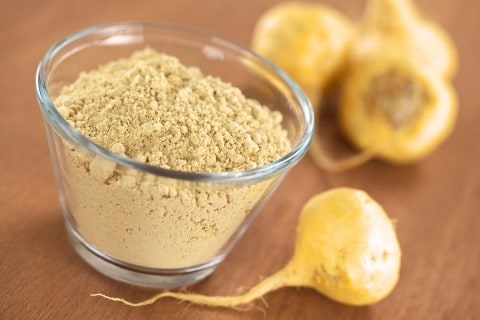
In addition, factors like advancing age, poor diet, too much or too little exercise, adrenal exhaustion and stress, lack of sleep, birth control pills, toxins and chemicals like pesticides contribute to hormonal imbalance.

Some common symptoms of this problem include anxiety, irritability, mood swings, insomnia, fatigue, weight problems, excess hair growth or hair loss, migraines, low sex drive, oily or dry skin, acne, food cravings, premenstrual syndrome, infertility and others.
As hormones impact metabolic functions, paying attention to sensations like your hunger, energy and cravings can give you a faint clue as to whether your hormones are in balance.
You can use natural home remedies and herbs to alleviate symptoms and even help restore your hormonal balance. It’s also important to consult your doctor for proper diagnosis and treatment.
Ask for your doctor’s advice before taking any herbal remedy or starting a supplement regimen, especially if you have a hormone-sensitive condition, such as uterine fibroids, endometriosis, breast cancer, uterine cancer or ovarian cancer.
Here are the top 10 home remedies for hormonal imbalance.
1. Omega-3 Fatty Acids
Omega-3 fatty acids play an important role in producing hormones, hence they are highly beneficial in balancing them. They are particularly beneficial for women as they help reduce menstrual cramps and menopausal symptoms. Due to their antioxidant and anti-inflammatory properties, omega-3 fats also have a profound effect on your health.

- Some good sources of omega-3 fatty acids are oily fish, flaxseeds, chia seeds, walnuts, soy beans, tofu, winter squash and olive oil. So, load up on these foods to treat your hormonal imbalance naturally.
- You can also take omega-3 supplements after consulting your doctor. The general dosage is 500 mg per day.
Maca root is an endocrine adaptogen that boosts normal hormone production. It also helps reverse hypothyroidism, increase fertility and is beneficial for libido. Being a good source of calcium, potassium, magnesium, iron, iodine, phosphorus, zinc, essential fatty acids, protein, fiber and sterols, it is good for your overall health and improves energy and vitality.

- Mix ¼ teaspoon of maca root powder in a cup of water, juice, herbal tea, smoothie or yogurt.
- Consume it daily, gradually increasing the amount of maca root up to 1 or 2 teaspoons over a few weeks.
- Continue at least for a few months.
Chasteberry, also called vitex, is a great hormonal tonic for women and mimics the calming effect of progesterone. It stimulates the pituitary gland, thus regulating the balance of estrogen and progesterone.

Chasteberry is considered excellent for reducing premenstrual syndrome and treating other menstrual problems. It also regulates ovulation and promotes fertility. The natural anti-androgen can also lower testosterone levels and protect against prostate cancer.
Take a 400 to 500 mg powder capsule daily for at least for a few months or until you are satisfied with the results. You can also take this herb in ticture form. Consult your doctor for proper dosage.
Note: Chasteberry may increase menstrual flow in some women. Do not take this herb during pregnancy, or when taking dopamine-related medications or hormone replacements.
4. Vitamin D
Vitamin D affects your pituitary gland, which produces a range of hormones. It can help relieve symptoms associated with low estrogen levels. It also affects your weight and appetite. A deficiency of this vitamin can lead to an abnormal release of parathyroid hormone.

- A few minutes of sun exposure daily can be of great help for the body for making vitamin D to sustain your hormones.
- You can also eat foods like oily fish, cod liver oil, milk and eggs that are rich in vitamin D.
- Another option is to take vitamin D supplements. For proper dosage, consult your doctor.
Engaging in physical activity is a great way to balance your hormones as it affects hormone production. It also lowers cortisol levels. Cortisol is a stress hormone that blocks estrogen and is detrimental to your overall health.

Regular exercise triggers the release of brain chemicals that improve your mood. This is helpful as hormonal imbalances often cause mood swings. Needless to say, it will also help you maintain a healthy weight. Avoid workouts longer than 40 minutes though, as they may increase your cortisol levels.
- Go swimming, walking, jogging or do other light exercises for 20 to 30 minutes daily or at least a few times a week.
- You can also try yoga and relaxation exercises to stimulate hormone functions and reduce stress.
Extra-virgin coconut oil is another effective natural home remedy for balancing hormones. It is particularly useful for those suffering from hypothyroidism as its medium-chain fatty acids promote healthy thyroid functioning.

Coconut oil also helps stabilize blood sugar levels, boost immunity, speed up your metabolism and promote weight loss. Contrary to the popular misconception, it is not bad for your heart. In fact, it may protect against heart disease.
Eat 2 to 3 tablespoons of extra-virgin coconut oil daily for at least a few months. It can be used very well in cooking as it does not produce harmful chemicals on heating due to its high smoke point.
7. Fenugreek
Fenugreek seeds contain a phytoestrogen called diosgenin that is believed to have an estrogenic effect. Herbalists often recommend this herb for increasing lactation and natural breast enlargement.

It also helps improve glucose metabolism, thus proving useful for diabetics to lower blood sugar and glucose metabolic disorder associated with obesity.
- Steep 1 teaspoon of fenugreek seeds in a cup of hot water for about 15 minutes. Strain and drink this tea 2 or 3 times a day. You can also add some honey and lemon juice for taste.
- Another option is to take this herb in supplement form. For proper dosage, consult your doctor.
8. Holy Basil
Holy basil is another excellent remedy for balancing hormones as it works as a natural adaptogen. It helps lower and stabilize cortisol levels; high levels of cortisol adversely affect the thyroid gland, ovaries and pancreas. Plus, holy basil improves mental clarity and elevates mood.

- Simply eat a few holy basil leaves daily for at least a few months.
- You can also drink basil tea prepared by boiling a few holy basil leaves in a cup of water for a few minutes. Strain and drink this tea daily, up to 3 cups.
- Another option is to take this herb in supplement form, 250 to 500 mg on a daily basis. Consult your doctor first.
Asian ginseng (Panax ginseng), also known as Korean red ginseng, helps regulate the adrenal gland that produces stress hormones. It acts as an adaptogen to keep a proper hormonal balance in your body.
Studies suggest that this herb may also be useful in relieving some of the symptoms of menopause. It can help increase sperm production and motility as well.

This herb should be taken in cycles. So, take 200 to 400 mg of Asian ginseng extract (standardized to contain at least 4 percent ginsenosides) daily for 2 to 3 weeks, take a break for 3 weeks and resume again. Continue for up to 3 months.
Note: This herb may interact with certain medications, increase the effects of stimulants and lower blood sugar. Consult your doctor before taking it.
10. Ashwagandha
Ashwagandha (Withania somnifera) is a popular Ayurvedic herb that helps increase your energy and reduce stress and fatigue.

Also, it helps restore your body’s hormonal balance as it acts as an adaptogen and reduces cortisol. It increases the production of DHEA (dehydroepiandrosterone), testosterone and androgens. Plus, it helps improve thyroid function.
Take 300 mg of ashwagandha twice daily for a few months. Consult your doctor first.
Additional Tips
- Eat healthy fats like those present in avocados and raw butter.
- Choose organic foods over non-organic.
- Include fiber and phytonutrient-rich foods like cabbage, kale, broccoli and Brussels sprouts in your diet. Phytonutrients enhance the detoxification capacity of the liver, thus flushing out toxins from the body.
- When dealing with menopausal symptoms, eat fermented soy products. Soy, however, is not good for those suffering from underactive thyroid.
- Eliminate refined carbohydrates from your diet by avoiding processed and packaged foods.
- Limit your caffeine intake as it increases cortisol levels that slow down your thyroid function.
- Manage your stress and get proper sleep.
- Steer clear of synthetic hormones, such as birth control pills.
- Reduce exposure to environmental toxins, especially by limiting the use of plastic.

http://www.ncbi.nlm.nih.gov/pubmed/15385858
http://www.ncbi.nlm.nih.gov/pmc/articles/PMC3614604/












Post a Comment